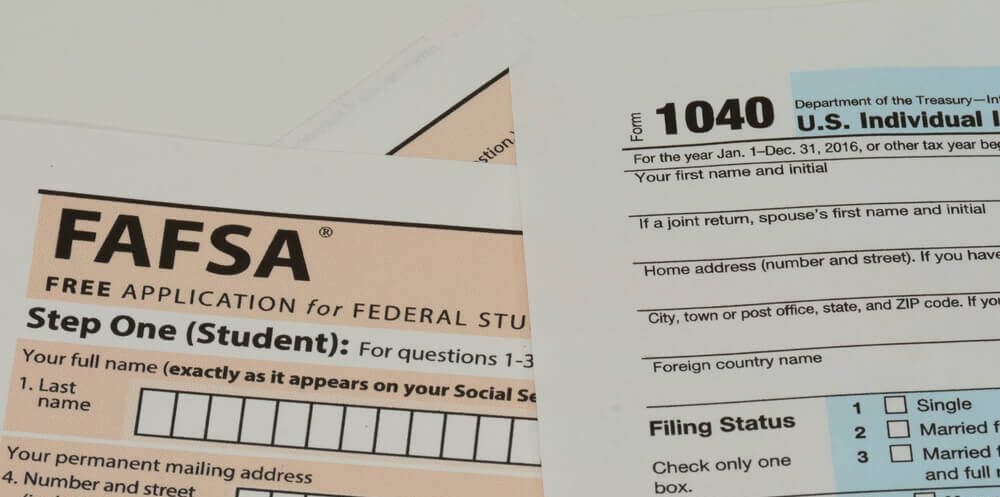Student-centric advice and objective recommendations
Higher education has never been more confusing or expensive. Our goal is to help you navigate the very big decisions related to higher ed with objective information and expert advice. Each piece of content on the site is original, based on extensive research, and reviewed by multiple editors, including a subject matter expert. This ensures that all of our content is up-to-date, useful, accurate, and thorough.
Our reviews and recommendations are based on extensive research, testing, and feedback. We may receive commission from links on our website, but that doesn’t affect our editors’ opinions. Our marketing partners don’t review, approve or endorse our editorial content. It’s accurate to the best of our knowledge when posted. You can find a complete list of our partners here.
How to Fill Out the FAFSA if Parent Did Not File Income Tax

 By
Gabriel Jimenez-Ekman
By
Gabriel Jimenez-Ekman 
Gabriel Jimenez-Ekman is a content editor and writer at Scholarships360. He has managed communications and written content for a diverse array of organizations, including a farmer’s market, a concert venue, a student farm, an environmental NGO, and a PR agency. Gabriel graduated from Kenyon College with a degree in sociology.
Full BioLearn about our editorial policies

Cait Williams is a Content Writer at Scholarships360. Cait recently graduated from Ohio University with a degree in Journalism and Strategic Communications. During her time at OU, was active in the outdoor recreation community.
Full BioLearn about our editorial policies

Annie has spent the past 18+ years educating students about college admissions opportunities and coaching them through building a financial aid package. She has worked in college access and college admissions for the Tennessee Higher Education Commission/Tennessee Student Assistance Corporation, Middle Tennessee State University, and Austin Peay State University.
Full BioLearn about our editorial policies

Maria Geiger is Director of Content at Scholarships360. She is a former online educational technology instructor and adjunct writing instructor. In addition to education reform, Maria’s interests include viewpoint diversity, blended/flipped learning, digital communication, and integrating media/web tools into the curriculum to better facilitate student engagement. Maria earned both a B.A. and an M.A. in English Literature from Monmouth University, an M. Ed. in Education from Monmouth University, and a Virtual Online Teaching Certificate (VOLT) from the University of Pennsylvania.
Full BioLearn about our editorial policies

Filling out the FAFSA can be tricky if your parents have no income tax filed. But students whose parents have an authorized extension on their taxes have nothing to fear. Although the process will be slightly more complicated, you will be able to receive aid. If your parents have documentation of their income from the previous year, you can still complete the FAFSA.
Don’t miss: Scholarships360’s free scholarship search tool
Why didn’t my parents file their taxes?
You may be wondering why your parents haven’t filed their income taxes. There are many possible explanations for this, but here we will go over a few of the most common. It’s important to determine the reason your parents haven’t filed. If their failure to file is unauthorized, you may be disqualified from federal aid. Here are some common reasons for not filing taxes by the deadline:
Received an extension
Your parents may have filed for an extension from the IRS. Taxpayers are automatically granted a 6-month extension if they file before the deadline. If your parents required an extension for any reason and filed in time, they may not have their taxes yet.
Living out of the country
Taxpayers who live outside the country receive an extra two months to file. They are not required to file an extension. If your parents live outside of the country and have not yet filed, don’t fret. It may count as an excused extension in the eyes of the IRS.
Military suspension of filing deadline
Active members of the military may receive an extension on their taxes without having to file for one.
Unauthorized failure to file taxes
In this situation, your parents have not received permission from the IRS to extend their deadline. Regardless of any extenuating circumstances, if they do not fit in the categories above, their delay is unauthorized. In this situation, you may be disqualified from federal aid. That being said, students whose parents are incarcerated or institutionalized may be able to file as an independent. Additionally, failures to file due to natural disasters may be excusable. Students affected by a natural disaster should reach out to the IRS and financial aid administrators for assistance.
Apply to these scholarships due soon
See all easy scholarshipsWhat documents do I need to file the FAFSA?
Students whose parents have filed their taxes will have a simpler time filing the FAFSA. The FAFSA form is integrated into the IRS Data Retrieval Tool, which imports financial information automatically. But this tool cannot be used if your parents have not filed their taxes. Fortunately, if your parents’ failure to file is authorized, you’ll be able to fill out the FAFSA using other documents. It’ll just take a little more work.
Alternative forms if your parents haven’t filed their taxes:
- Parents’ last pay stub of the year in question
- Combination of their W-2 and 1099 forms
- Signed statement that lists their adjusted gross income, if they are self-employed
Because you are inputting information by hand, you should take extra care to ensure that it’s accurate. Overreporting of income may result in a lower financial aid package. Conversely, underreporting can lead to legal trouble. If it’s determined that your underreporting was intentional, it is considered fraudulent.
What if my parents don’t have the necessary forms?
If your parents don’t have any of the necessary forms on-hand, they should be able to obtain them. Employers are legally required to provide these documents upon request. Unfortunately, some employers may be slow to provide the information. As a result, it’s a good idea to start collecting them long before the FAFSA deadline.
What if my parents’ failure to file is unauthorized?
If your parents did not receive permission to delay their filing, you will be ineligible for financial aid. If your parents simply forgot to file, you should urge them to do so immediately. If your parents are unwilling to file their taxes for other reasons, unfortunately, there is little that you can do. However, you shouldn’t be discouraged from still trying to pursue your degree! Your best option may be to take a gap year and work to save up money to pay for school on your own, or to look into affordable alternatives to a four-year college. These can include coding bootcamp, trade school, community college, and certificate programs. You can also explore income share agreements as a way to pay for your education!
Frequently asked questions about how to fill out the FAFSA if parent did not file income tax
What happens if you have no income for FAFSA?
Why does FAFSA ask for untaxed income?
Do I have to file taxes if I only get financial aid?












